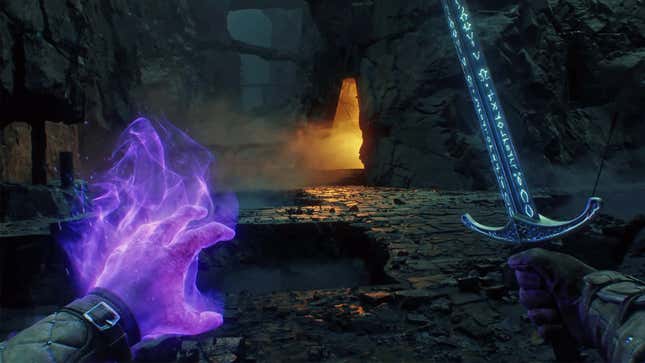
During January 18's Xbox Developer Direct, Obsidian Entertainment announced that Avowed, its next big open-world RPG, will launch this fall. It’s currently slated to appear on Xbox Series X/S and PC. It also released the first gameplay for the upcoming Skyrim-like RPG.
In the new trailer, Obsidian Entertainment showed off various gameplay elements, including the seamless transition from melee to ranged combat with spells, guns, and swords—so you can play how you want when you want. There are even parries and special attacks to provide variety during fights, particularly as enemies appear to be tactical in their approach to encounters. Hell, you can even dual-wield wands if you really want to be a gunslinging mage. It looks rad.
Avowed is an RPG set in the same world, Eora, as the Pillars of Eternity series. While the Pillars of Eternity games are traditional top-down RPGs, Avowed is more like Skyrim, featuring first-person combat, exploration, magic, and a plethora of choice-based decisions that impact the game’s narrative.
The game was first revealed via a short teaser trailer back in July 2020, during another Microsoft showcase. It’s being built using Unreal Engine 4 like Obsidian’s other first-person RPG, The Outer Worlds. But unlike previous Obsidian games, Avowed will be exclusive to Xbox and PC, ditching PlayStation and Switch.
This isn’t surprising considering that Microsoft bought Obsidian Entertainment back in 2018 and is publishing Avowed. And like all other first-party Xbox games, it will launch day one on the company’s subscription service Game Pass.
Read More: Microsoft Has 23 First-Party Studios, Here’s What They’re Making
After Microsoft purchased the studio, Obsidian released Grounded, a first-person survival game that launched exclusively on Xbox and PC in July 2020. Before that, in 2019, it released The Outer Worlds, a first-person RPG that played a lot like the studio’s highly regarded 2010 adventure Fallout: New Vegas. The Outer Worlds was in development before the Microsoft buyout and as such was published by Private Division for multiple consoles—including a very, very rough Switch port.





